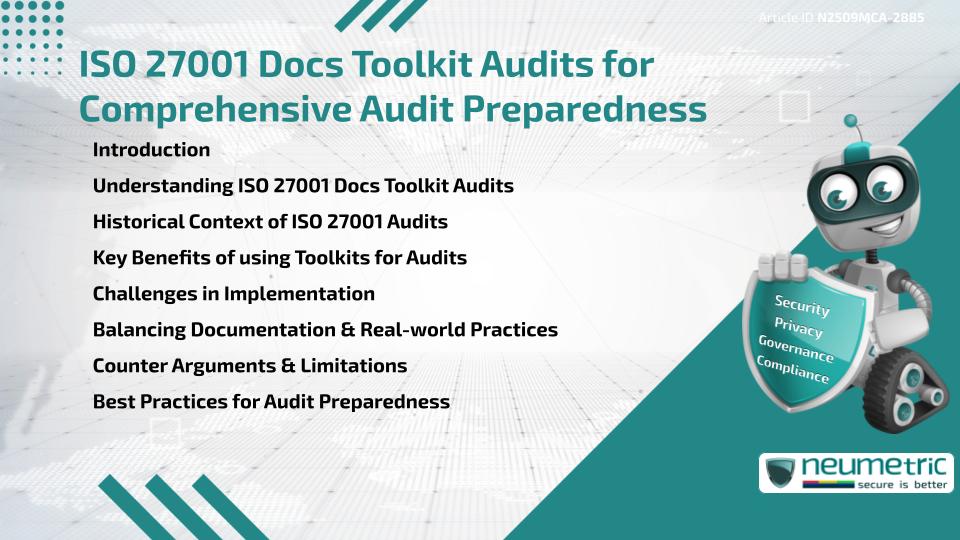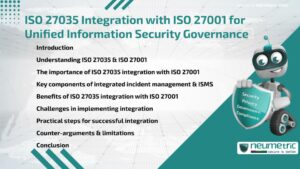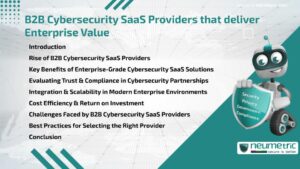Table of Contents
ToggleIntroduction
The ISO 27001 Docs Toolkit Audits approach helps Organisations prepare effectively for Compliance with the International Organisation for Standardization [ISO] 27001. This Standard defines How to establish, implement & maintain an Information Security Management System [ISMS]. Toolkits provide Ready-to-use Documentation, Checklists & Guidance that enable Organisations to streamline Audit preparation, improve efficiency & demonstrate Compliance. This article explores how ISO 27001 Docs Toolkit Audits support businesses, the challenges they pose & the Best Practices to follow.
Understanding ISO 27001 Docs Toolkit Audits
Iso 27001 Docs Toolkit Audits provide Structured Documentation & Templates covering essential ISMS elements such as Policies, Risk Assessments, Access Control procedures & monitoring practices. By using Toolkits, Organisations can avoid building documents from scratch, ensuring they meet Audit requirements faster & with greater consistency.
Historical Context of ISO 27001 Audits
ISO 27001 originated in 2005, evolving from British Standards for Information Security. Over time, it became the leading Global Benchmark for managing Information Security Risks. Traditionally, preparing for Audits involved manual documentation, consuming Time & Resources. The emergence of Toolkits simplified this Process, making Certification accessible to both small & large Organisations.
Key Benefits of using Toolkits for Audits
- Time Savings: Pre-designed Templates shorten Preparation Cycles.
- Standardization: Ensures Policies align with ISO 27001 Clauses & Controls.
- Audit Readiness: Checklists highlight Compliance Gaps before External Reviews.
- Cost Efficiency: Reduces reliance on expensive Consultancy Services.
- Scalability: Applicable to Organisations of varying Sizes & Industries.
Challenges in Implementation
Despite these benefits, iso 27001 Docs Toolkit Audits are not without hurdles:
- Generic Templates require customization to reflect real Operations.
- Over-reliance on Documentation may weaken actual implementation.
- Smaller Organisations may lack Expertise to adapt Toolkits effectively.
- Toolkits cannot fully replace Professional guidance in complex cases.
Balancing Documentation & Real-world Practices
Documentation alone cannot satisfy ISO 27001 Auditors. Policies & Procedures must also be actively followed. For instance, having a Toolkit-based Risk Assessment policy is insufficient unless Risks are regularly evaluated & addressed. Combining well-structured documents with actual Operational practices is essential for meaningful Compliance.
Counter Arguments & Limitations
Some experts argue that Toolkits encourage a “Box-ticking” approach to Audits, focusing more on Paperwork than Security outcomes. Others highlight that Toolkits rarely address Sector-specific requirements, such as Healthcare or Finance, which may need additional controls beyond generic Templates.
Best Practices for Audit Preparedness
- Customise Templates: Adapt documents to reflect unique organizational needs.
- Conduct Internal Audits: Use Toolkit Checklists to identify gaps before Certification.
- Engage Teams: Involve IT, Compliance & Leadership in developing & maintaining ISMS documents.
- Regular Updates: Keep Toolkit-based Policies aligned with new Risks & Regulatory changes.
- Blend Expertise with Toolkits: Combine Ready-to-use resources with Professional advice for stronger Compliance.
Conclusion
The ISO 27001 Docs Toolkit Audits Method offers Organisations a Practical Way to prepare for Certification efficiently & consistently. By balancing the convenience of Toolkits with customization & genuine implementation, businesses can ensure Compliance, strengthen their ISMS & achieve comprehensive Audit Preparedness.
Takeaways
- The ISO 27001 Docs Toolkit Audits streamline Audit preparation with Templates & Checklists.
- Benefits include efficiency, standardization & reduced costs.
- Challenges involve customization, Expertise gaps & over-reliance on documents.
- Best Practices focus on tailoring documents, conducting Internal Audits & Combining Toolkits with Professional guidance.
FAQ
What are ISO 27001 Docs Toolkit Audits?
They are Structured sets of Templates & Checklists that help Organisations prepare for ISO 27001 Certification.
Why are Toolkits useful for Audits?
They reduce preparation time, improve Compliance consistency & highlight Audit gaps.
Do Toolkits replace Consultants?
No, while they reduce dependency, Consultants are often needed for complex ISMS needs.
What challenges do Toolkits present?
Challenges include customization, lack of Expertise & Risk of Checklist-only Compliance.
Can Small Businesses use ISO 27001 Docs Toolkit Audits?
Yes, Toolkits are scalable & adaptable for businesses of any size.
References
- ISO/IEC 27001 Standard – ISO
- National Institute of Standards & Technology Cybersecurity Framework
- Information Security Management Systems Overview – BSI Group
- Cloud Security Alliance – Compliance Guidance
- European Union Agency for Cybersecurity – ISMS Practices
Need help for Security, Privacy, Governance & VAPT?
Neumetric provides organisations the necessary help to achieve their Cybersecurity, Compliance, Governance, Privacy, Certifications & Pentesting needs.
Organisations & Businesses, specifically those which provide SaaS & AI Solutions in the Fintech, BFSI & other regulated sectors, usually need a Cybersecurity Partner for meeting & maintaining the ongoing Security & Privacy needs & requirements of their Enterprise Clients & Privacy conscious Customers.
SOC 2, ISO 27001, ISO 42001, NIST, HIPAA, HECVAT, EU GDPR are some of the Frameworks that are served by Fusion – a SaaS, multimodular, multitenant, centralised, automated, Cybersecurity & Compliance Management system.
Neumetric also provides Expert Services for technical security which covers VAPT for Web Applications, APIs, iOS & Android Mobile Apps, Security Testing for AWS & other Cloud Environments & Cloud Infrastructure & other similar scopes.
Reach out to us by Email or filling out the Contact Form…





